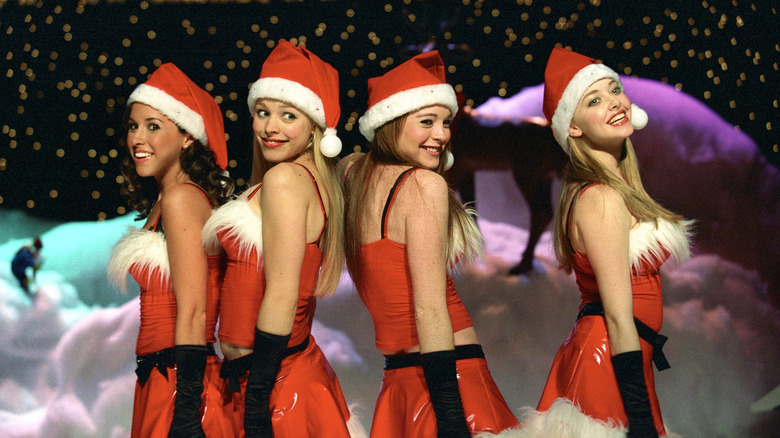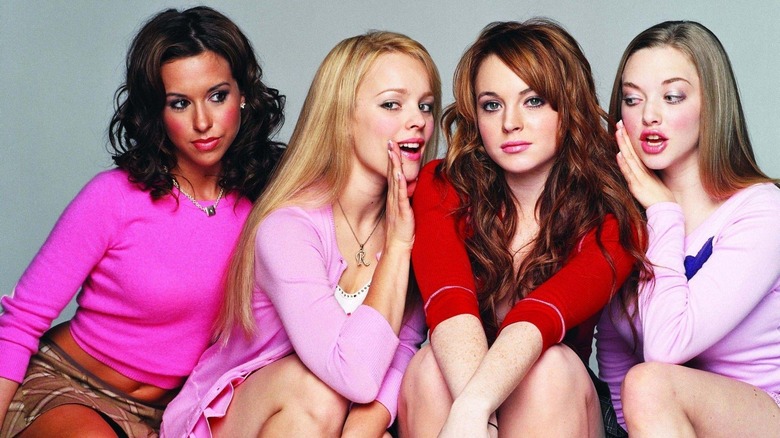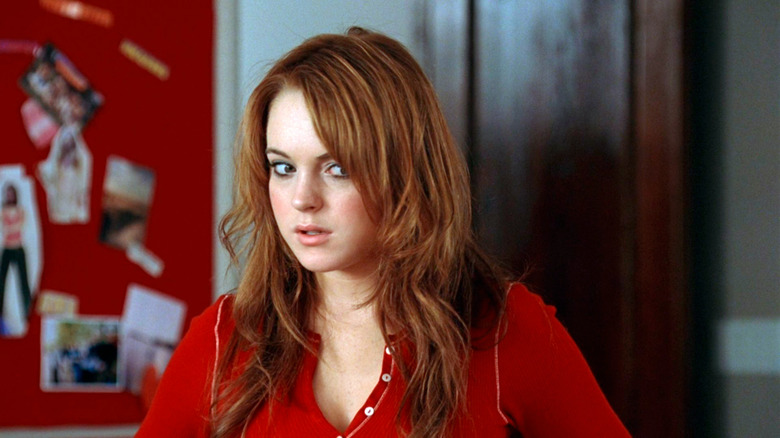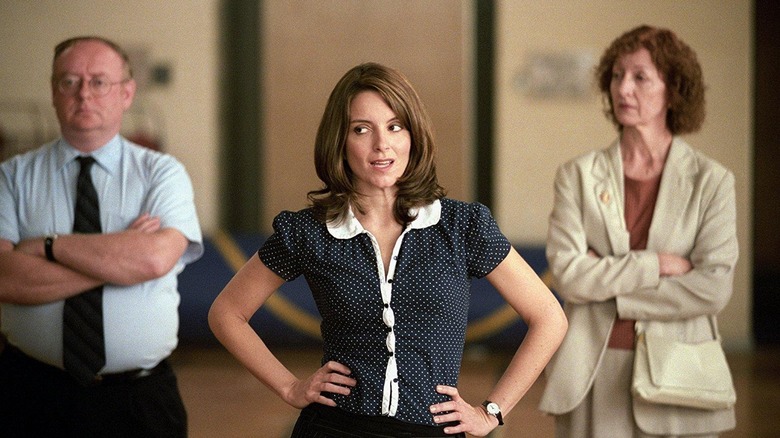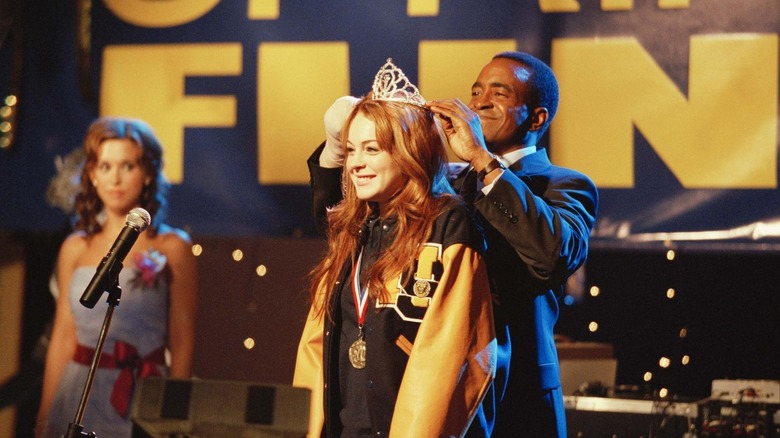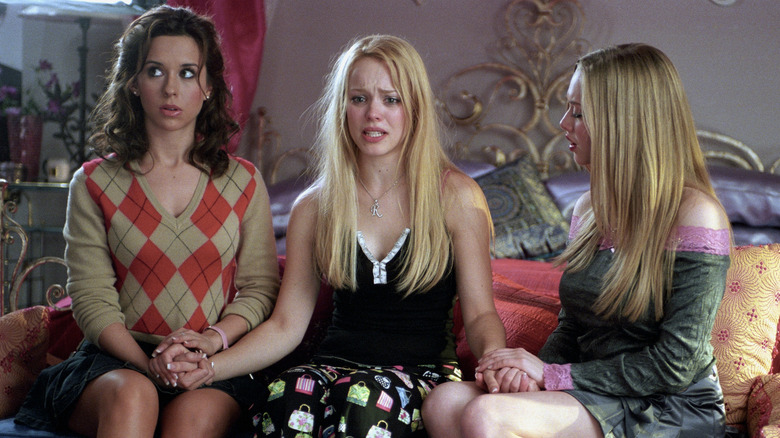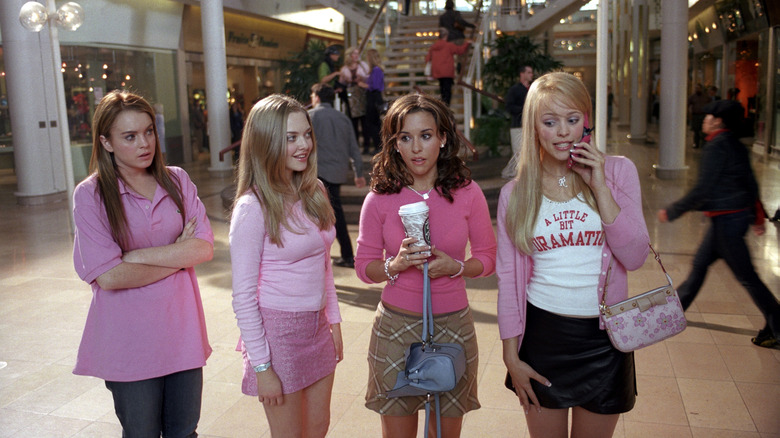20 Years Ago, Mean Girls Made Fetch Happen At The Box Office
(Welcome to Tales from the Box Office, our column that examines box office miracles, disasters, and everything in between, as well as what we can learn from them.)
"I read this script and thought, 'This is the best script I've read in God knows how long.'" That's what director Mark Waters told Entertainment Weekly in 2014 about his reaction to reading Tina Fey's script for "Mean Girls." At the time, it was called "Homeschooled" but the title didn't matter. What mattered was what was on the page. Those words on those pages would inspire one of the most successful movies about the high school experience ever made.
"I had been wanting to try to learn how to write a movie. I had been looking for a subject matter for me for a couple of years," Fey, who was then working as the head writer on "Saturday Night Live," told ET in 2004. "When I got this book, 'Queen Bees and Wannabes,' which is the book that the movie is loosely based on, this is the first time I thought, 'Oh here's this topic, it's really kind of juicy, and it's funny. Maybe this will be the one to try.'" Try she did, and succeed she did, as the film was not only an unexpected success in its day, but one with a lasting legacy that spawned an unlikely franchise and, amazingly enough, remains Fey's only feature screenplay credit.
In this week's Tales from the Box Office, in honor of the release of Paramount's "Mean Girls" musical, we're looking back at the original hit. We'll look at how the film came to be, how Fey had to turn a book with no plot into a narrative feature, how the filmmakers assembled the perfect cast, what happened when the movie hit theaters, and what lessons we can learn from it nearly 20 years later. Let's dig in, shall we?
The movie: Mean Girls
"Queen Bees and Wannabes," written by Rosalind Wiseman, was a book for parents that focused on how high schools form cliques, as well as patterns of aggressive teen girl behavior. It was based on interviews with real teenage girls but did not contain an actual narrative. So while Fey was inspired by the book to take a crack at a screenplay, she had to figure out how to turn what Wiseman had put on the page into a cohesive story.
"I first imagined, 'Oh! It's going to be about this teacher,'" Fey said recently to the New York Times. "It's going to be like 'Stand and Deliver.' And the more I read the book, the more research I did, [I realized] the girls were the most interesting part. The true stories of the way young women behaved were insidious, but they were also kind of funny in their vicious cleverness."
Fey ended up using a combination of elements from her teen experiences as well as the book to craft the narrative. She even used the names of real people from her life for the characters in the film. In a 2014 retrospective in Entertainment Weekly, she explained why she made that decision.
"I tried to use real names in writing because it's just easier. My older brother's good friend is Glenn Coco. He's a film editor in Los Angeles, and I imagine it's a pain in the butt for him. Someone said to me you could buy a shirt at Target that says 'You go, Glenn Coco!' That was unexpected."
What Fey ended up with was "Mean Girls," which centers on a girl named Cady Heron (Lindsay Lohan) who, after living in Africa with her zoologist parents, goes to a public high school where she is taken in by the popular girls, The Plastics, who are led by the cool and cruel Regina George (Rachel McAdams).
Casting the mean girls
Lohan started as a child star in hits like "The Parent Trap" and had recently collaborated with Mark Waters on Disney's "Freaky Friday" remake, which was also a hit. So it made a lot of sense for them to collaborate again. "I was lucky enough that Paramount, and Mark Waters, and Lorne Michaels, the producers did let me have a little say in the casting," Fey said at a pre-release press junket in 2004. "We were all in complete agreement about Lindsay."
While it may be true that they agreed that Lohan should be in the movie, who she would play was very much up for debate in the early going. During that same 2014 EW reunion interview, Lohan explained that she initially wanted to play Regina George, as she wanted to expand her range as an actor. Waters had other ideas. As she explained:
"I wanted to play Regina. I had just played — in "Confessions [of a Teenage Drama Queen] and 'Freaky [Friday]' — not the cool girl in school. I was still 17 years old and I wanted to be the cool girl on set. So I had a war with him, and he goes, 'No, Cady is the heroine, and that's who you are.' Then I sat in all the auditions. Amanda [Seyfried] auditioned to play Regina as well. It ended up being Rachel, and she's wonderful."
McAdams had been working a bit, appearing in movies like "The Hot Chick," but this was truly her big break. Fey appeared as Ms. Norbury, while some of her "SNL" castmates such as Amy Poehler and Tim Meadows would take on other adult roles. The rest of the core cast was filled out with other up-and-comers such as Amanda Seyfried as Karen and another former child star, Lacey Chabert as Gretchen Wieners.
The R-rated version of Mean Girls
While the core four had thoughts on who they wanted to play, Waters had a vision. Seyfried explained how she came to the role of Karen in the 2014 EW piece:
"Mark Waters was like, 'You have something I want. Let's see if you work for Karen.' He was so amazing. He saw comedic timing I didn't see, and thank God for that. You only get so many breaks in your life. I just wanted to be in the movie. To be asked to play Karen, I was like, 'Great! Whatever!'"
One thing that Fey wanted to do, at least in her original script, was to capture the genuine high school experience, as so many other movies had done before as representations of their time. John Hughes ("The Breakfast Club") was the king of the genre for a time. The problem? That meant the script was very much R-rated as it was littered with cursing and other things that high schoolers would be doing or saying. Paramount, understandably, wanted a PG-13 release. As Waters explained in the EW piece in 2014, they ended up going back and forth with the MPAA over the rating.
"We had to go back to the MPAA several times. They kept wanting to give us an "R," and we had to kind of keep peeling things back and eventually got to the final version, which made [PG-13] by the skin of our teeth. ... The 'wide-set vagina' [line] is one I have a special affection for because that's the line we had to throw ourselves in front of the train tracks with the MPAA [for], because they didn't want to let us keep that line. "
In the end, Paramount and Waters prevailed and they secured a PG-13 rating. That proved to be a battle worth fighting as the tamer version of the film is one that resonated with audiences in ways they couldn't have possibly predicted.
The financial journey
"Mean Girls" hit theaters on April 30, 2004, in the pre-summer window. That can sometimes be a lucrative spot for the right film as May is when the full-blown summer blockbuster push truly begins. The film opened against several other newcomers including "Laws of Attraction," "Godsend," and "Envy." With all due respect to those movies, it was Waters' film based on Fey's script that managed to not only win the weekend but remains the film that we still talk about today.
The film not only opened at number one with a $24.4 million haul, but it obliterated pre-release expectations by a significant margin. Tony Scott's thriller "Man on Fire" ($15 million) came in at number two on its second weekend, while "13 Going on 30" ($9.8 million) took the number three spot in its second frame. So it wasn't even particularly close. While the high school comedy would have to surrender the crown to "Van Helsing" the following weekend it hardly mattered. We're talking about a movie with an $17 million budget that made more than that in a single weekend domestically. It was a home run.
By the time its theatrical run concluded, "Mean Girls" had amassed $86 million domestically to go with $44 million internationally for a grand total of $130 million. The film made more than seven times its production budget yet, amazingly enough, Paramount didn't rush to make a sequel. The largely forgettable "Mean Girls 2" premiered on ABC Family in 2011 but no proper, theatrically-released follow-up ever materialized. But the legacy of the film endured, that much is certain.
Having a hit in theaters is one thing — and it's a very good thing. But so many hits still end up disappearing in the larger cultural consciousness after that theatrical run is over. "Mean Girls," on the other hand, managed to endure well beyond its life on the big screen.
A long-lasting legacy
Phrases from the movie such as "That was so fetch" and "Get in loser, we're going shopping" are now part of the cultural lexicon. Even people unfamiliar with the film have probably heard these phrases. It truly resonated with its audience and new generations of high schoolers have continued to discover it. Paramount, as a result, has benefited greatly from home video sales, cable rights, and merchandise. Money was made well beyond the box office.
That's why we have a new musical version of the film for the new generation in theaters right now. That new musical version is, itself, influenced by the Broadway musical that was inspired by the film. It became a franchise that has encompassed both the stage and the screen. And for all of the success that Fey has on classic shows like "30 Rock" and "SNL" both as a writer and performer, this remains the only movie script to her name. It's remarkable but if she never did another thing on the silver screen, she'd have made her mark.
It's worth noting that Rosalind Wiseman, whose book inspired this whole franchise, is not exactly happy with how things panned out. She's actively in a dispute with Paramount over profit participation, recently revealing to the New York Post that she hasn't been paid anything after making her deal for the film rights. Wiseman believes she's owed compensation for her part in the phenomenon.
"I think it's fair for me to be able to get compensated in some way for the work that has changed our culture and changed the zeitgeist. Over the years Tina's spoken so eloquently about women supporting other women, but it's gotten increasingly clear to me that, in my own personal experience, that's not going to be the experience. You don't just talk about supporting women, you actually do it."
In an eye-roll-worthy bit of studio accounting nonsense, Paramount has allegedly told Wiseman that they have not profited from the franchise. Success remains elusive even for resounding success stories, it seems.
The lessons contained within
The first thing that springs to mind for me looking back at "Mean Girls" is that Fey and Co. were reluctant to capitalize on the success of the film with a sequel right away. It's an impressive bit of restraint that allowed the original to continue to feel special. The musical version now has a chance to reach a new generation, allowing the saga of Cady Heron and Regina George to live on for decades more to come.
But why was this movie such a surprising, resounding success? It's all about making a movie for an underserved audience. So often, Hollywood seems to ignore making movies for women outside of rom-coms or other so-called "chick flicks." Last year showed us just how much money is being left on the table as "Barbie" became one of the highest-grossing movies of all time. It's ridiculous that nearly 20 years later this is a lesson that still needs to sink in. Fey, speaking with IGN in 2004, summed the whole thing up pretty well.
"I've seen the movie with some test audiences and it seems like, it's funny because, like, 14- [and] 13-year-old girls kind of watch the movie like it's 'Sophie's Choice' or something. They can't believe the drama that is unfolding before them. They're rapt. I think they get — because I think it's a little — I think for girls, it's a little close to the bone. It's a little scary, actually."
Sure, it's a funny movie but it was also a movie that tried to capture something honestly. It did so effectively, and there's no substitute for striking a chord with an audience. Beyond that, it's downright silly that Paramount can try to claim they haven't made any money from a film this successful. Wiseman should certainly be cut in on that success as her book inspired the whole enterprise. Because to steal a line from Gretchen Wieners, "I don't think my father, the inventor of Toaster Strudel, would be too pleased to hear about this."
